Boost Your Event's Attendance Rate with Effective Text Messaging

Why SMS Marketing is a Game-Changer for Event Attendance
Unmatched Effectiveness of SMS Messaging for Events
SMS marketing stands out as an exceptionally effective tool for event communication. With an open rate approaching 98-99%, SMS messages are read almost instantly — typically within minutes of receipt. This immediacy ensures that crucial event information, such as invitations, reminders, and last-minute updates, reliably reach attendees and stakeholders.
Outstanding Open and Response Rates
Unlike emails or social media notifications, which commonly suffer from lower visibility due to crowded inboxes or algorithmic limits, SMS commands direct attention. Response rates can reach as high as 45%, significantly outpacing email engagement. This means event organizers not only reach attendees but also encourage timely replies, confirmations, and participation.
Advantages Over Other Communication Channels
SMS offers unique advantages that set it apart. Its brevity and directness cut through digital clutter, making messages easy to read and act upon quickly. Because most people carry their mobile devices constantly, SMS communication keeps event details top-of-mind and reduces no-shows. Furthermore, SMS supports real-time communication, ideal for urgent alerts and schedule changes during events.
By integrating SMS as part of an event marketing strategy, organizers can maximize attendance, streamline communication, and build stronger attendee engagement across every stage of the event lifecycle.
Harnessing SMS for Seamless Event Promotion and Real-Time Engagement
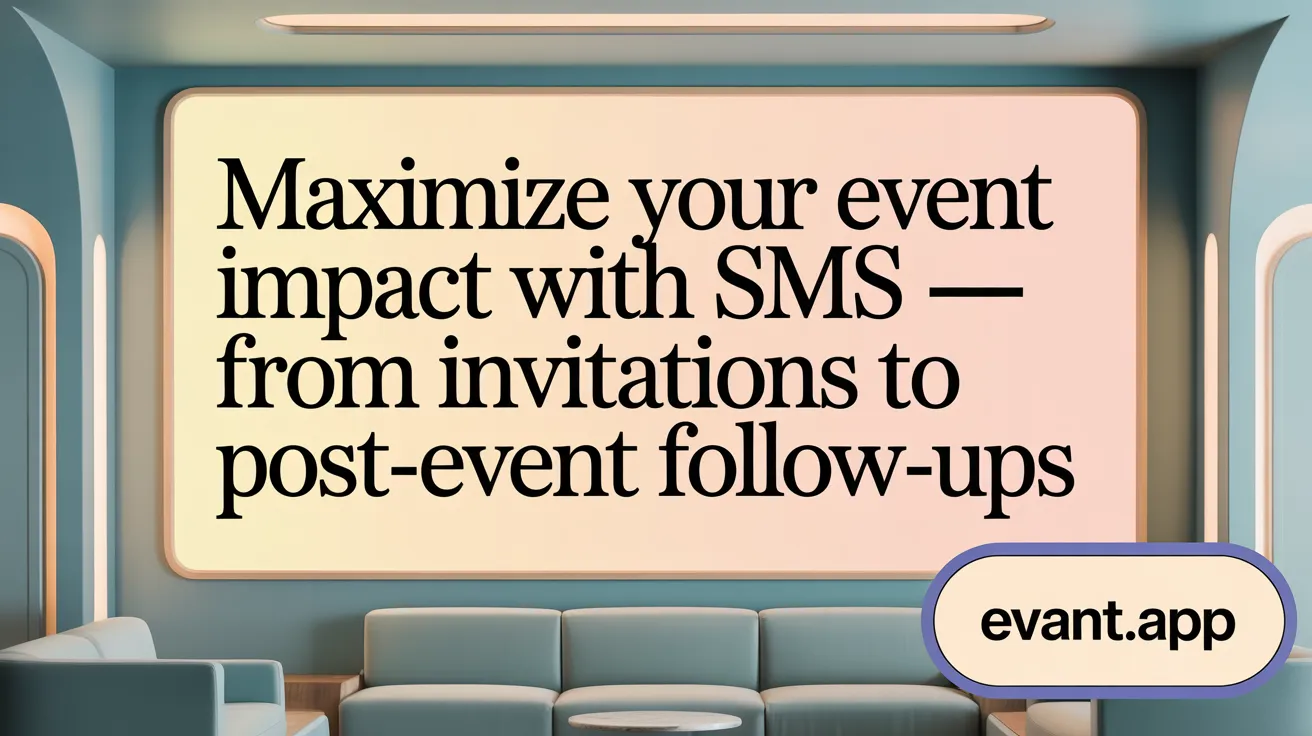
Using SMS at Different Event Stages
SMS communication is a versatile tool that enhances event engagement before, during, and after events. Organizers use SMS to invite guests, provide timely reminders, share urgent updates, and maintain ongoing connections through follow-ups. Learn more about the SMS event marketing benefits.
Pre-Event Invitations and Reminders
Sending personalized SMS invitations and reminders significantly boosts attendance. Messages are typically concise, including essential event details like name, date, time, location, and a clear call-to-action link for easy registration. Scheduling reminders—initial invites weeks prior, follow-ups one week before, and final alerts 24–48 hours ahead—build anticipation without overwhelming recipients. Collecting opt-in consent ensures compliance and improves message delivery.
Real-Time Updates During Events
SMS enables immediate communication of schedule changes, venue updates, or emergency alerts, keeping attendees informed and engaged. Two-way SMS messaging allows participants to RSVP, ask questions, or participate in live polls and Q&A sessions, fostering interaction and enhancing the experience. Explore real-time SMS updates and two-way event communication.
Post-Event Follow-Ups and Surveys
After the event, SMS facilitates sending thank-you messages, sharing event recaps, and collecting feedback via short surveys. These follow-ups help maintain community engagement and guide improvements for future events. See strategies on SMS post-event follow-ups and collecting event feedback through SMS.
Reducing No-Shows
Automated SMS reminders have proven to reduce no-shows by up to 45%. Timely nudges ensure the event stays top-of-mind for attendees, improving punctuality and overall participation. Discover more about reducing event no-shows.
By integrating SMS at every phase—focused invitations, real-time communication, and thoughtful follow-ups—event organizers streamline logistics, elevate engagement, and maximize turnout effectively. For further insights, visit SMS marketing automation and SMS event communication.
Personalization, Segmentation, and Automation: The Keys to SMS Success

Why Is Audience Segmentation Important?
Segmenting your audience allows event organizers to tailor SMS messages to specific groups such as VIPs, volunteers, past attendees, or different registration statuses. This targeted SMS messaging for VIPs and ticket holders increases relevance and engagement because recipients receive information that directly applies to them, boosting attendance and participation.
How Does Message Personalization Enhance Engagement?
Personalized texts that include the recipient’s name or reference previous event attendance feel more direct and meaningful. These messages show you understand your audience, making them more likely to respond positively. Incorporating accessible links and concise event details further enhances action rates with personalized SMS campaigns.
What Role Does Automation Play in SMS Campaigns?
Automation streamlines sending timely SMS invitations, reminders, last-minute updates, and post-event follow-ups without manual effort. Platforms like Mailchimp and Textellent enable scheduling, trigger-based messaging, and two-way SMS messaging, ensuring consistent engagement and reducing no-shows.
How Is Compliance Maintained Through Opt-In Requirements?
Obtaining explicit opt-in consent from recipients is legally required and essential for delivering SMS marketing. Methods include online forms, keywords, and QR codes to collect permissions respectfully. Double opt-in practices improve list quality and adherence to regulations like TCPA, reducing risks of penalties. SMS platforms with SMS compliance features help manage opt-ins and opt-outs effectively.
Why Are Integrations With CRM Systems Valuable?
Integration with CRM platforms such as Salesforce or HubSpot centralizes contact management and campaign tracking. This makes segmentation more effective, simplifies message personalization, and provides real-time analytics to continually refine SMS strategies for better results, as shown by CRM integration benefits.
Together, segmentation, personalization, automation, opt-in compliance, and CRM integration form a powerful foundation that maximizes SMS marketing success for events, making communication timely, relevant, and efficient.
Driving RSVPs and Reducing No-Shows with Interactive SMS Features
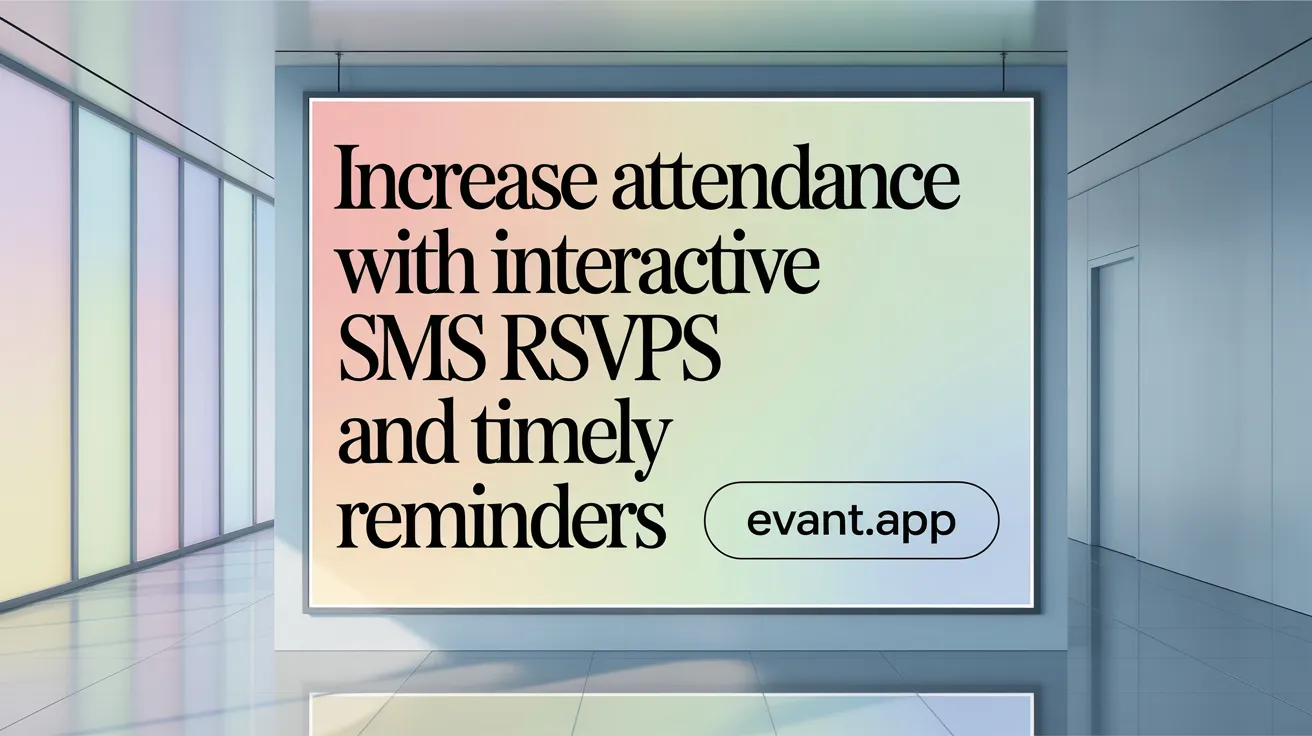
What Are Text-Based RSVP Systems and How Do They Work?
Text-based RSVP systems let organizers send invitations and collect responses instantly via SMS. With these systems, attendees can reply directly to confirm their attendance, simplifying the confirmation process. Platforms like Trumpia and Text-Em-All automate RSVP collection, allowing for real-time response tracking and follow-ups, enhancing efficiency compared to traditional mail or email invites. See also best practices and examples of RSVP via text messaging.
How Does Two-Way Messaging Improve Event Engagement?
Two-way SMS allows attendees not only to RSVP but also to ask questions, provide special requests, or give feedback. This interaction boosts engagement and personalizes communication. Features include automated keyword responses and conversational texting, helping organizers manage inquiries promptly and update guest lists dynamically. Learn more about two-way event communication and strategies for engaging event guests with text messages.
Why Are Timely SMS Reminders Crucial?
Reminders sent 24 to 48 hours before events significantly reduce no-shows, with studies showing reductions up to 45%. Timely texts keep the event top-of-mind and allow attendees to adjust plans if necessary. Automated systems can schedule multiple reminders, including initial invites, follow-ups, and last-minute alerts. Explore how to reduce event no-shows with SMS reminders and automate SMS event reminders. Additionally, see benefits of event reminders via SMS and cost-effective strategies for SMS event marketing.
What Are Best Practices for RSVP Templates and Etiquette?
Clear, concise, and polite language is essential. Messages should include event details (name, date, location) and a simple call-to-action (e.g., reply YES or NO). Personalization by including recipient names increases response rates. Templates should be respectful and encourage prompt replies to aid planning. See RSVP text message templates and tips and best practices for text RSVPs.
How Does Dynamic Guest List Management Work?
Interactive SMS RSVPs enable real-time updates to guest lists, allowing organizers to add or remove attendees smoothly. This flexibility supports better event logistics and attendee experience by accommodating last-minute changes and maintaining accurate attendance data. Learn about managing guest lists with SMS and event registration management.
Interactive SMS RSVP features streamline communication, boost attendance, and foster a positive event experience, making them an indispensable tool for modern event management. For more, see resources on SMS event marketing benefits and SMS event communication strategies.
Leveraging Analytics and Metrics to Optimize SMS Event Campaigns
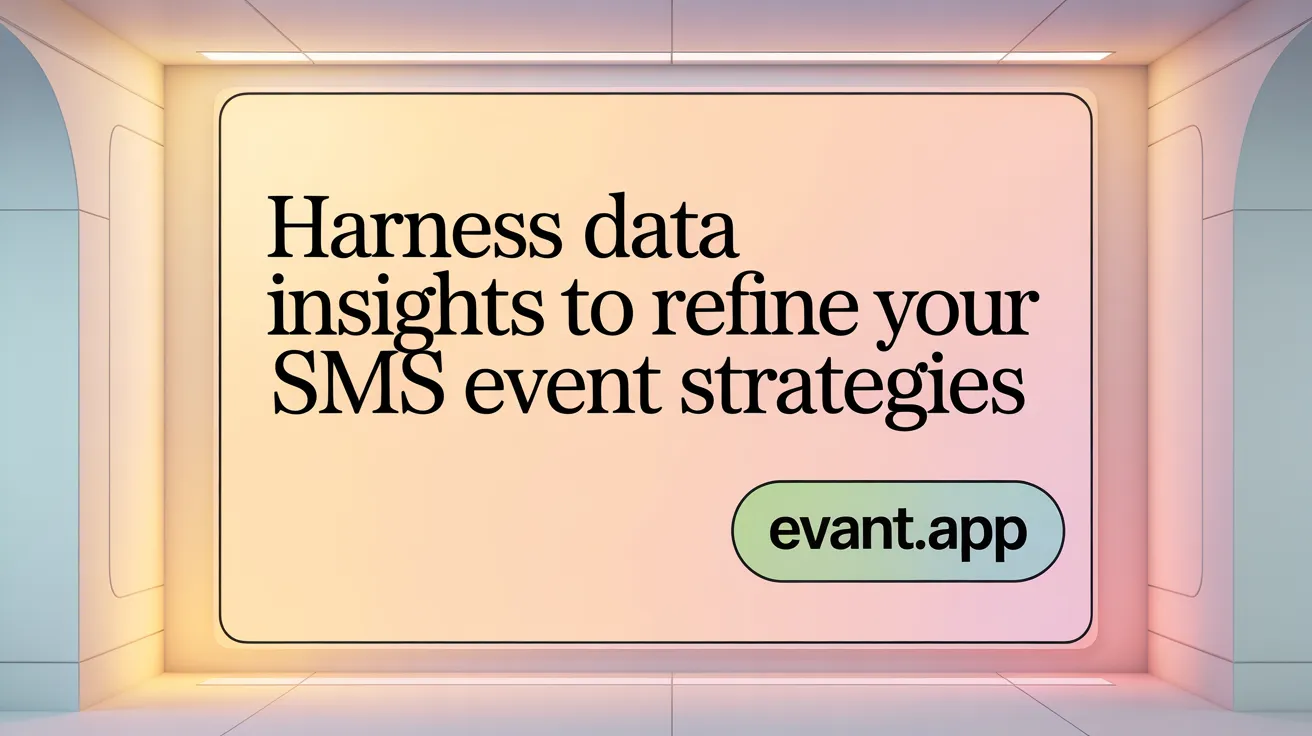
Tracking Open and Response Rates
SMS messaging boasts an impressive open rate of over 98%, far surpassing email and other communication channels. Real-time tracking of how many recipients open messages ensures that your event communications are reaching your audience promptly. Furthermore, response rates—often around 45%—offer valuable insight into attendee engagement and interest. For more details on SMS open rates and real-time SMS delivery, see resources on the high engagement SMS campaigns and SMS campaign performance analytics.
Click-Through and Conversion Rates
Beyond opens and replies, click-through rates (approximately 19% on average) to links such as registration pages or event details provide a clear measure of how effectively your messages drive actions. Conversion rates, such as actual event sign-ups, are crucial for assessing the tangible impact of your SMS campaign on attendance. Learn more about increasing event registrations with SMS links and easy event registration via SMS.
Survey Results Analysis
Post-event SMS surveys capture attendee feedback quickly and conveniently. Analyzing survey responses helps organizers understand participant satisfaction and identify areas for improvement. These insights contribute to more tailored and attendee-centric future events. Check out best practices for SMS feedback requests, post-event surveys via text as well as collecting post-event feedback via SMS surveys.
Using Data to Refine Messaging Strategies
By reviewing these key metrics, organizers can tailor the timing, frequency, personalization, and segmentation of messages. For instance, personalization with recipients’ names or adapting messages for VIPs versus general attendees can increase relevance and engagement. Tracking opt-out rates also signals when communication frequency or content may require adjustment. See audience segmentation for SMS campaigns, personalized SMS campaigns, and SMS compliance features to optimize your messaging.
Platform Reporting Tools
Many SMS platforms, such as Mailchimp, Voxie, CrowdPass, and Blackthorn, offer integrated dashboards that consolidate delivery stats, open rates, response data, and survey outcomes. These tools empower event managers to make data-driven decisions, optimizing campaigns to boost attendance and improve event experience. For additional options, see event SMS messaging analytics and reporting and real-time SMS updates and confirmation tracking.
Using analytics transforms your SMS strategy from guesswork to a refined communication approach, ensuring every message counts toward a successful event.
Integrating Visual and Multimedia Content in SMS to Enhance Engagement
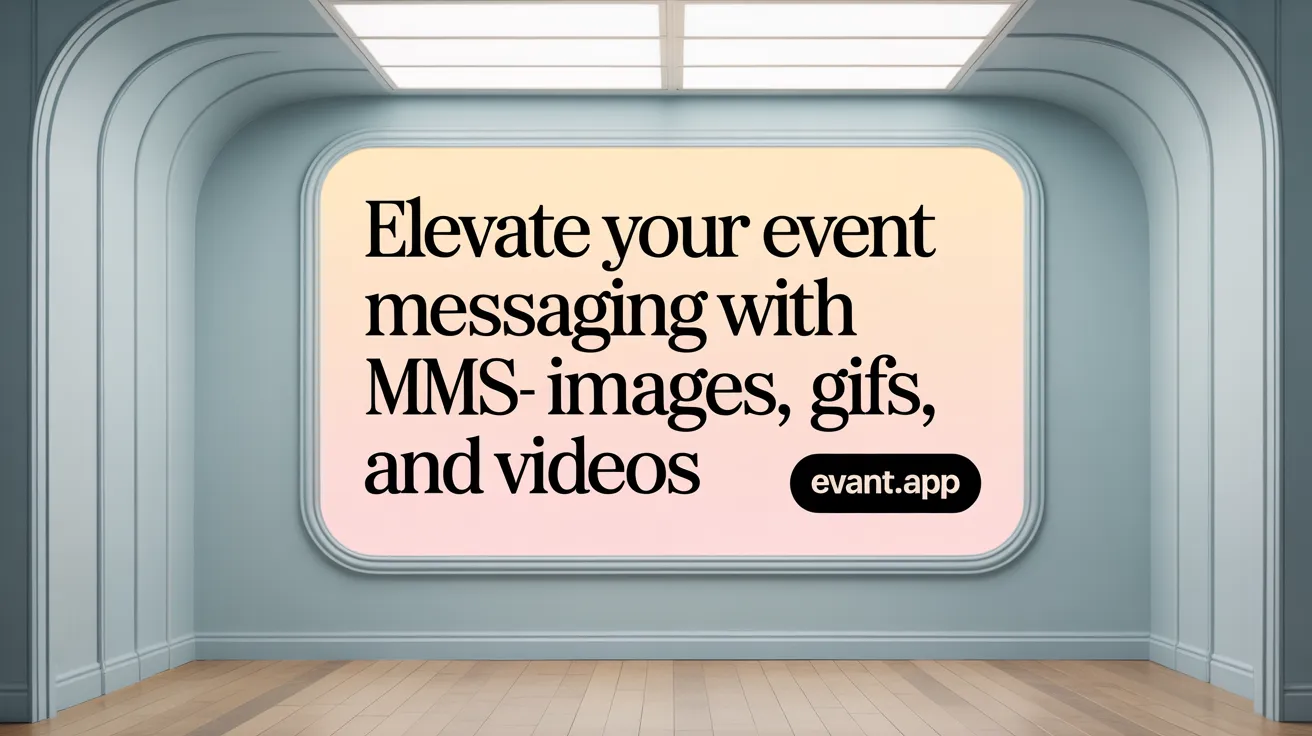
Why Incorporate MMS in SMS Event Marketing?
Multimedia Messaging Service (MMS) enriches SMS campaigns by allowing the inclusion of images, GIFs, and videos. These elements make messages more eye-catching and engaging, which helps boost visibility and capture the audience's attention effectively. Learn more about the benefits of SMS for events and SMS event marketing.
Using Images, GIFs, and Videos
Visuals such as photos, animated GIFs, and short videos offer compelling ways to showcase event highlights, maps, speaker profiles, or exclusive sneak peeks. This multimedia approach not only raises excitement but can also clarify event details better than text alone. Explore how MMS Messaging enhances event engagement and how MMS visuals increase SMS engagement.
Benefits of Visual Content
MMS boosts message appeal and engagement rates, with recipients more likely to read and respond to messages featuring multimedia. Visuals provide a richer storytelling avenue, fostering stronger connections with attendees and encouraging participation. See strategies for high engagement SMS campaigns and effective event SMS communication.
Balancing File Size and Delivery Speed
To ensure efficient delivery and optimal user experience, it’s important to manage file size. Large multimedia files can slow delivery or hinder message receipt. Compressing images and keeping videos concise help maintain quick load times and high deliverability. For best practices on effective SMS reminders and messaging, check out SMS campaign optimization tips and SMS event marketing automation.
Incorporating MMS thoughtfully in SMS campaigns is a powerful strategy to elevate event communications, making messages stand out in busy inboxes while ensuring timely arrival. Discover how SMS marketing automation and personalization enhance these communications.
Choosing the Right SMS Platform for Effective Event Communication
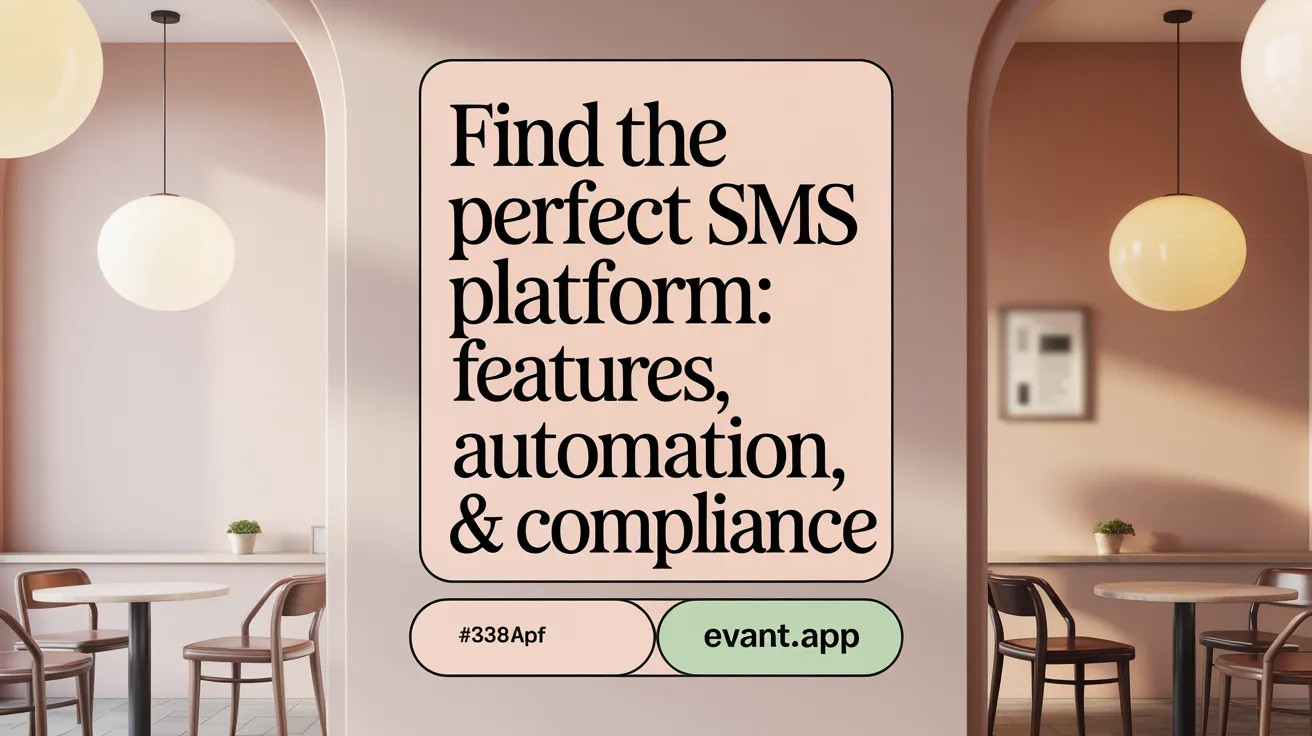
What features make an event SMS platform stand out?
Effective event SMS platforms offer a combination of automation, bulk messaging, segmentation, real-time updates, and compliance tools. Platforms like Textellent SMS platform, CrowdPass SMS messaging features, Blackthorn Salesforce-native messaging app, and Mozeo SMS Platform provide comprehensive management interfaces integrating messaging with registration, ticketing, and attendee data. They also deliver detailed analytics including delivery status, open rates, responses, and engagement metrics to help organizers refine campaigns.
How do automation and scheduling improve event communication?
Automation allows pre-scheduling event invites, reminders, last-minute alerts, and post-event follow-ups, saving time while ensuring consistent engagement. For example, Blackthorn triggers SMS based on real-time registration, payment, or check-in events, while Textellent automates personalized campaigns including segment-tailored messages. Scheduled messaging ensures critical details reach attendees at the optimal time for maximum impact through SMS marketing automation.
Why is bulk messaging and segmentation important?
Bulk messaging lets organizers quickly reach large audiences, vital for major events or urgent updates. Segmentation further refines this reach by targeting specific groups such as VIP guests, volunteers, or past attendees with tailored content—boosting message relevance and engagement. Platforms like Text-Em-All and Voxie support filtering and group broadcasts to enable precise, impactful communication.
What role do real-time communication capabilities play?
Real-time SMS delivery enables immediate sharing of last-minute venue changes, schedule updates, emergency alerts, or interactive elements like live polls and Q&A sessions, enhancing attendee experience and operational agility. Platforms such as CrowdPass and SMS-iT support instant two-way communication and quick response collection, improving event flow and participant interaction.
How do compliance and security features protect both organizers and attendees?
Legal compliance involves managing opt-in consent, opt-outs, data privacy, and message frequency limits under regulations like TCPA. Trusted platforms incorporate these by supporting explicit consent collection, allowing easy unsubscribes, and ensuring data security with audit trails and encryption standards (PCI, HIPAA). This safeguards reputation, reduces legal risks, and fosters trust with attendees, as detailed with SMS compliance features and SMS compliance requirements.
Choosing an SMS event communication platform with these capabilities empowers event organizers to efficiently engage audiences, streamline logistics, and improve attendance through personalized, timely, and compliant messaging.
The Role of SMS in Nonprofit and Educational Event Management
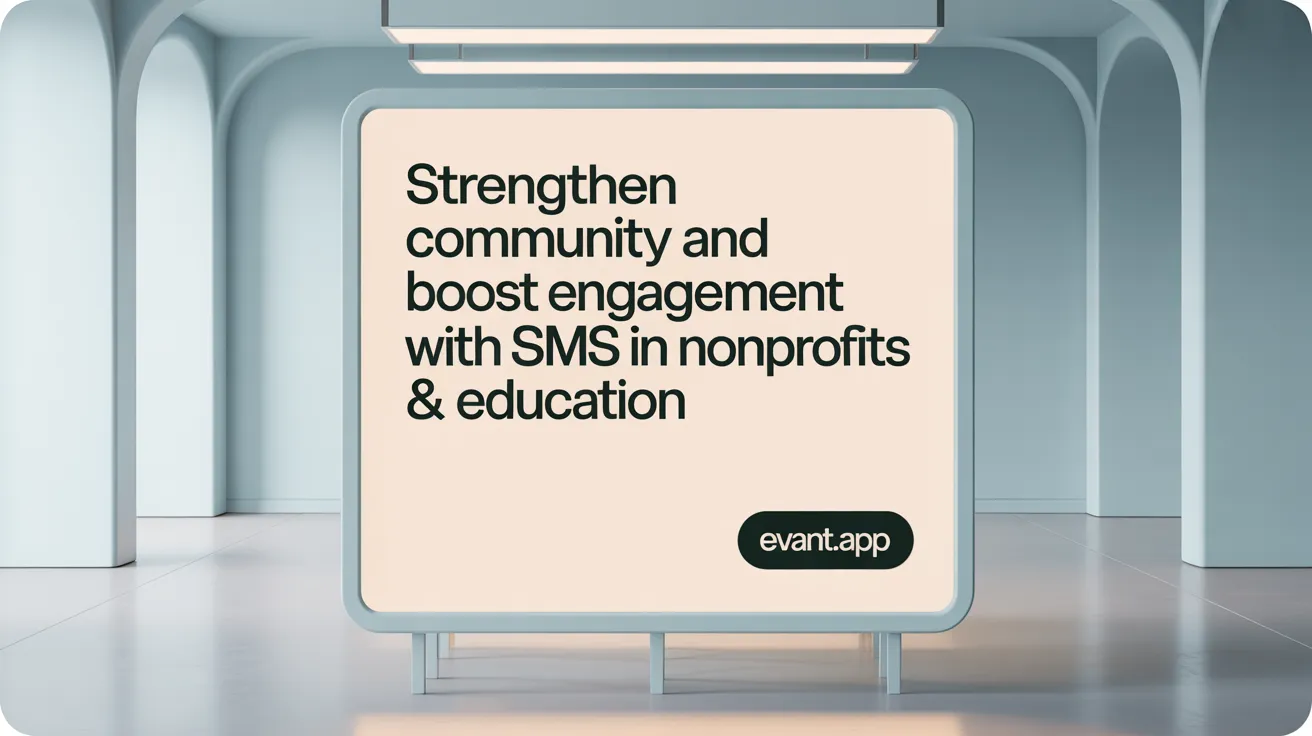
How is SMS used specifically in nonprofit and educational events?
SMS offers nonprofits and educational organizations a highly effective communication channel with an open rate of around 98%. It supports timely event promotion, reminders, and RSVP management while complying with legal requirements through opt-in consent collection. Text messages streamline volunteer coordination by confirming schedules, sending urgent alerts, and recruiting support efficiently. For fundraising events, SMS drives donations by delivering targeted campaigns and instant thank-you messages, creating a direct, personal donor experience (Text Fundraising for Nonprofits) and supporting a SMS-driven multi-channel fundraising approach.
In what ways does SMS facilitate volunteer coordination during events?
Volunteer management benefits from SMS through automated shift reminders, emergency notifications, and recruitment messages (Volunteer Management via Text Messaging. This real-time communication helps to maintain volunteer engagement and ensures schedules are adhered to without much administrative effort. Platforms supporting SMS allow personalized outreach and quick updates, making volunteer coordination more agile and responsive (SMS for nonprofits). The use of SMS compliance features also ensures that volunteer communications remain legal and effective.
How does SMS enhance fundraising events for these organizations?
Fundraising events leverage SMS campaigns to mobilize donors with time-sensitive appeals and follow-ups (Driving Donations with SMS Campaigns. Immediate confirmations and personalized thank-you texts increase donor retention and engagement. Incorporating SMS into a multi-channel fundraising approach maximizes reach and fosters a sense of urgency and community among supporters. Automation like SMS marketing automation can further enhance impact and scalability of campaigns.
What role does CRM integration play in SMS campaigns for these events?
Integrating SMS platforms with CRM systems like Salesforce or HubSpot enhances message targeting, automation, and tracking (Integrating SMS with CRM, HubSpot integration for SMS campaigns). This ensures efficient management of contacts, segmentation for personalized messaging, and comprehensive analytics to optimize campaign performance. Seamless CRM integration reduces manual workloads and improves data-driven decision-making (Event Management Platform & Automation). Additionally, features like SMS audience segmentation enable highly targeted communication based on data insights.
How does SMS help foster community within nonprofits and educational groups?
Beyond event logistics, SMS nurtures ongoing engagement by delivering impact updates, success stories, volunteer opportunities, and thank-yous (Personalized donor updates. Quick post-event follow-ups and surveys conducted via SMS encourage feedback and build a continuous relationship with supporters (Collecting post-event feedback via SMS surveys). Personalized messages aid in maintaining a vibrant and involved community around the organization’s mission (SMS audience segmentation) and ensure authentic two-way communication (Two-way SMS messaging.
Unlocking Attendance Potential with Strategic SMS Practices
SMS Benefits for Event Attendance
SMS boasts an exceptional open rate of around 98%, ensuring event messages are promptly seen by recipients. Its immediacy enables organizers to share real-time updates, reminders, and last-minute changes, crucial for boosting attendance and reducing no-shows. Cost-effective and high in engagement, SMS drives RSVPs, facilitates volunteer coordination, and supports post-event follow-up, creating a holistic communication loop.
Strategic Planning and Continuous Evaluation
A successful SMS campaign requires careful planning: segmenting audiences, timing messages strategically (initial invites, reminders, day-of alerts), and personalizing content to enhance relevance. Automation tools integrated with CRMs allow smooth management and targeted messaging. Ongoing evaluation through metrics like open, click-through, and conversion rates informs adjustments, ensuring maximum impact.
Future Outlook in Event Management
SMS continues to evolve with features such as two-way messaging, multimedia support, and AI-powered responses, enriching attendee engagement. Integrated, automated platforms promise sharper insights and seamless multi-channel strategies. As mobile usage grows, SMS will remain vital for event communication, helping organizers foster deeper community connections and optimize attendance.
Related Blogs
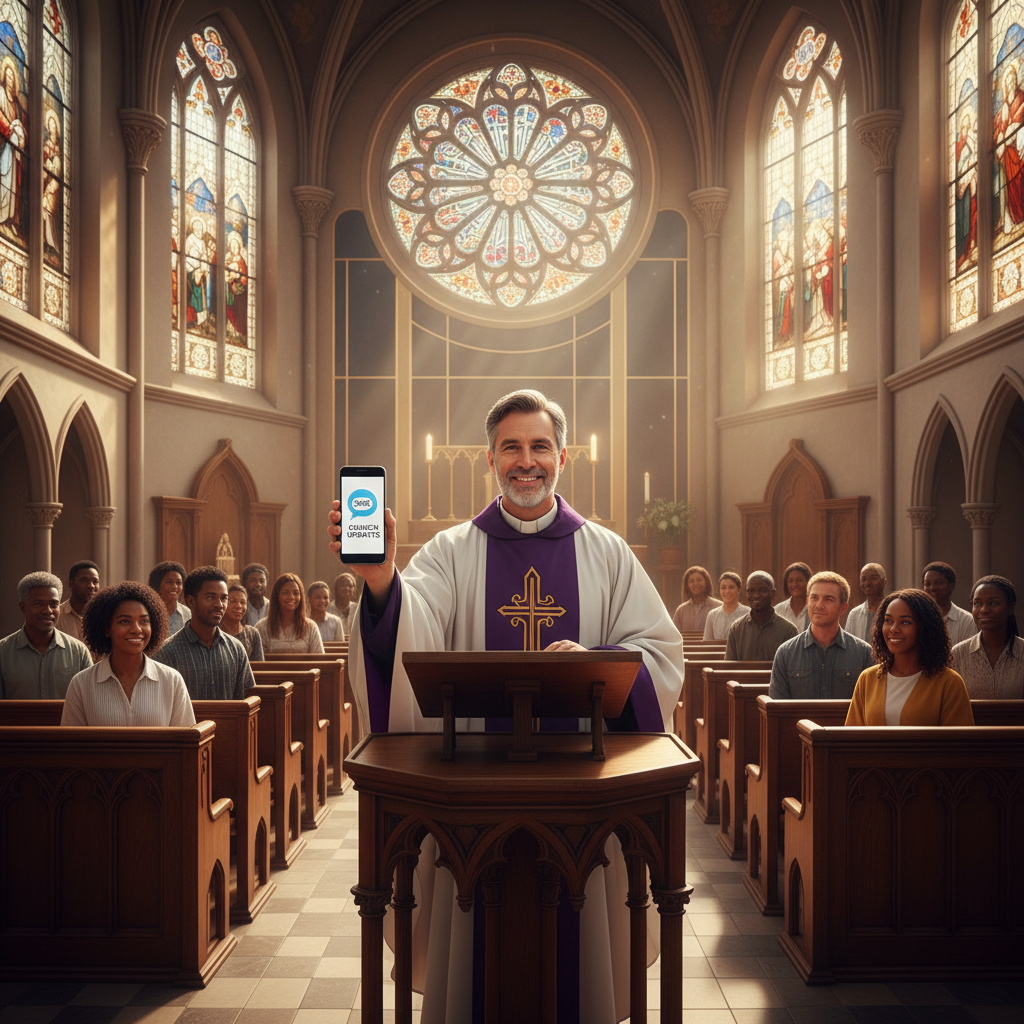

How Community Churches Should Leverage SMS to Boost Engagement
Michael PedoeemStruggling with low church attendance? Discover how to leverage SMS to reach 98% of your congregation instantly and review the top 5 church communication platforms.
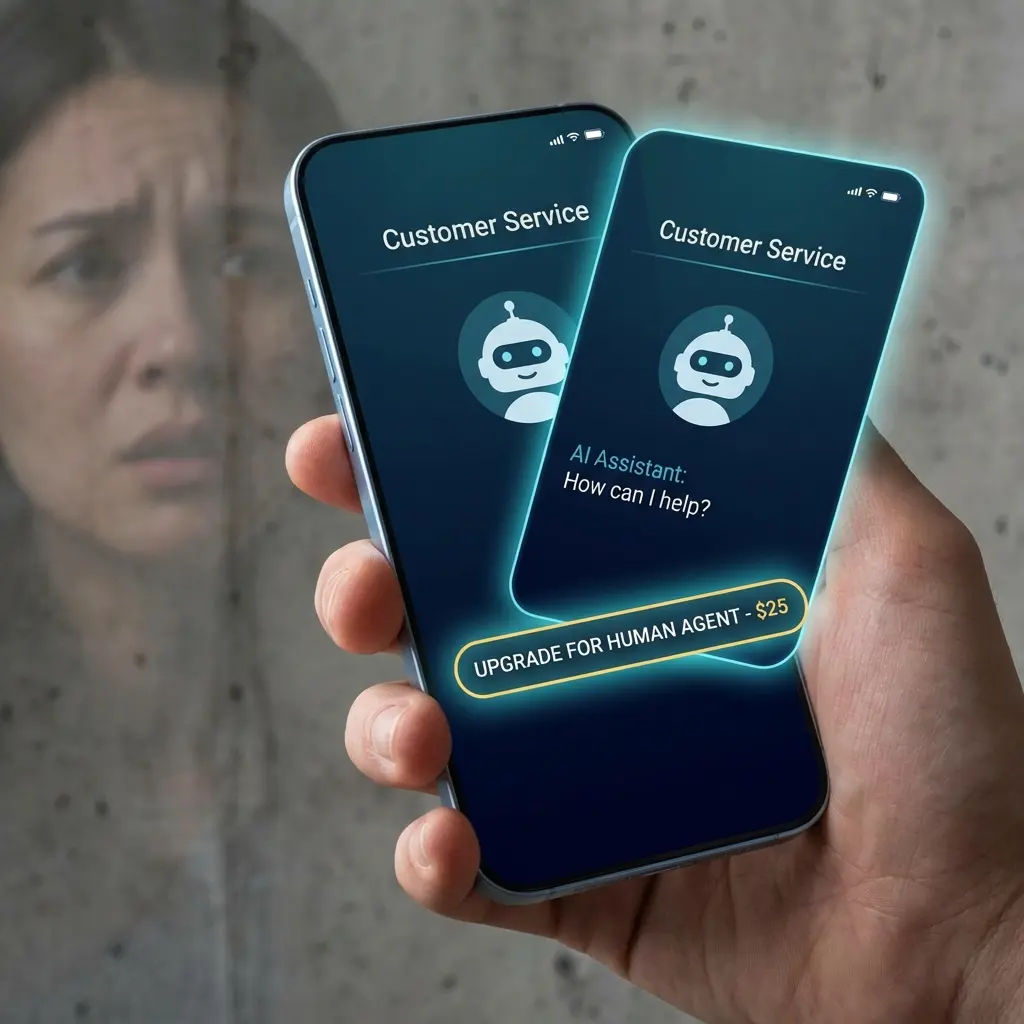

SMS for Churches: A Guide to Better Engagement
Michael PedoeemLearn how SMS for churches can boost engagement, improve communication, and streamline event management. Discover best practices for church texting today.
Ready to transform your community









